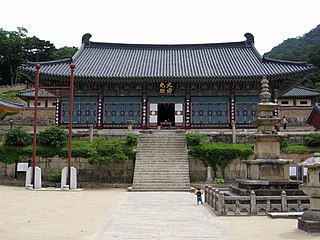
Haeinsa is a head temple of the Jogye Order of Korean Seon Buddhism in Gayasan National Park, South Gyeongsang Province, South Korea. Haeinsa is most notable for being the home of the Tripitaka Koreana, the whole of the Buddhist Scriptures carved onto 81,350 wooden printing blocks, which it has housed since 1398.

South Gyeongsang Province is a province in the southeast of South Korea. The provincial capital is at Changwon. It is adjacent to the major metropolitan center and port of Busan. There is UNESCO World Heritage Site Haeinsa, a Buddhist temple that houses the Tripitaka Koreana and attracts many tourists. Automobile and petrochemical factories are largely concentrated along the southern part of the province, extending from Ulsan through Busan, Changwon, and Jinju.

The Tripiṭaka Koreana or Palman Daejanggyeong is a Korean collection of the Tripiṭaka, carved onto 81,258 wooden printing blocks in the 13th century. It is the world's most comprehensive and oldest intact version of Buddhist canon in Hanja script, with no known errors or errata in the 52,330,152 characters which are organized in over 1496 titles and 6568 volumes. Each wood block measures 24 centimeters in height and 70 centimeters in length. The thickness of the blocks ranges from 2.6 to 4 centimeters and each weighs about three to four kilograms. The woodblocks are almost as tall as Mount Baekdu at 2.74 km when stacked, measure 60 km long when lined up, and weigh 280 tons in total. The woodblocks are in pristine condition without warping or deformation despite being created more than 750 years ago. The Tripiṭaka Koreana is stored in Haeinsa, a Buddhist temple in South Gyeongsang Province, in South Korea.

The Chinese Buddhist canon refers to the total body of Buddhist literature deemed canonical in Chinese, Japanese, Korean and Vietnamese Buddhism. The traditional term for the canon ."
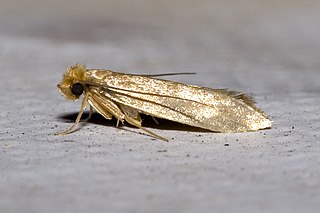
Tineoidea is the ditrysian superfamily of around 4000 moths species including clothes moths, carpet moths, bagworms and relatives. There are five families usually included within it, Eriocottidae, Dryadaulidae, Meessiidae, Tineidae and Psychidae, whose systematics are still under‐studied.

Cephalotaxus, commonly called plum yew or cowtail pine, is a genus of conifers comprising 11 species, treated in either the Cephalotaxaceae, or in the Taxaceae when that family is considered in a broad sense. The genus is endemic to eastern Asia, though fossil evidence shows it had a wider Northern Hemisphere distribution in the past. The species are evergreen shrubs and small trees reaching 1.0–10 m tall.
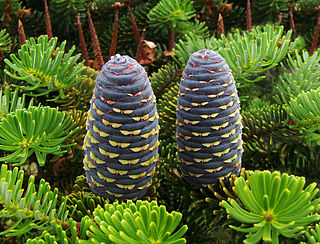
Abies koreana, the Korean fir, is a species of fir native to the higher mountains of South Korea, including Jeju Island. It grows at altitudes of 1,000–1,900 metres (3,300–6,200 ft) in temperate rainforest with high rainfall and cool, humid summers, and heavy winter snowfall.

The Korea Foundation is a non-profit public diplomacy organization established in 1991 to promote a better understanding of Korea and strengthen friendships in the international community. The Foundation carries out various projects for exchange between the Republic of Korea and foreign countries to cultivate mutual understanding.

Cephalotaxus harringtonii, commonly known as Japanese plum-yew, Harrington's cephalotaxus, or cowtail pine, is a coniferous bush or small tree in the family Taxaceae. It is native to Japan, but is occasionally utilised in western gardens and several cultivars exist for these purposes. Japanese plum yew has been in cultivation in Europe since 1829, and many modern horticulturists are familiar with this Japanese species, named in honor of Charles Stanhope, 4th Earl of Harrington, one of the first to grow the plant in a European garden, at Elvaston.

Cephalotaxus sinensis is a coniferous shub or small tree in the family Taxaceae. It is native to central and southern China.

Kong-guksu (콩국수) or noodles in cold soybean soup is a seasonal Korean noodle dish served in a cold soy milk broth. In the Korean language, kong means soybean and guksu means noodles. It comprises noodles made with wheat flour and soup made from ground soybeans. It is unknown when Korean people started eating kongguksu; however, in accordance with the mention of the dish along with kkaeguksu in Siui jeonseo, a Joseon cookbook published around the late 19th century, it is presumed to have originated at least as early as the 19th century.

Academy of Korean Studies is a South Korean research and educational institute with the purpose of establishing profound research on Korean culture. It was established on June 22, 1978, by Ministry of Education & Science Technology of South Korea (교육과학기술부). The Academy has dedicated to interpreting and analyzing Korean culture in general, defining the academic identity of Korean studies, and educating scholars.

"Hand in Hand" is a song by South Korean band Koreana that was the official song of the 1988 Summer Olympics in Seoul. It was sung in both Korean and English. The song is produced by Italian singer, songwriter, DJ and record producer Giovanni Giorgio Moroder. Its English lyrics were written by Tom Whitlock, and its Korean lyrics were written by Kim Moon-hwan. The song topped music charts in 17 countries, including Sweden, West Germany, the Philippines, Spain, Switzerland, Austria, Japan and Hong Kong. The album Hand in Hand sold more than 12 million copies worldwide. The song was featured in an episode of Pingu called Ice Hockey, although it was only put in the original version. In 2013, Giovanni Giorgio Moroder said that the original singer of the demo recording which he presented to PolyGram was Joe Pizzulo, not Koreana. It has since been translated and covered several times.

Dasik is a bite-size hangwa that is normally accompanied by tea. It can be made by kneading grain or other edible seed flour or pollen with honey, then pressing them into a decorative mould called dasikpan (다식판). A dasik plate usually consists of an assortment of dasik of different colours, including green, yellow, pink, black, and white. Typical ingredients include: rice flour, pine pollen, black sesame, chestnut, and soybean.
Sudan is a traditional Korean punch made with boiled grain cake balls and honied water. It is usually served during the summer for quenching thirst. Traditionally Sudan was always served during a village rite in 6th month in lunar calendar. Korean farmers prayed for a bountiful harvest and god's blessing for their life in the future by making food offering including foods and Sudan drink. It is sometimes considered a type of hwachae.
The Korean skate is a skate in the family Rajidae, and is the sole member of the genus Hongeo. It was previously classified in the genus Raja as Raja koreana until discoveries identified this species as a member of a distinct genus. It is considered Critically Endangered on the IUCN Red List due to overexploitation.
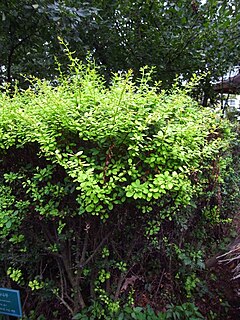
Berberis koreana, the Korean barberry, is deciduous shrub that can grow up to 5 feet (1.5 m) in height. The species is endemic to Korea. It is widely planted as an ornamental tree in North America, South America and Europe.

Catechin-7-O-glucoside is a flavan-3-ol glycoside formed from catechin.
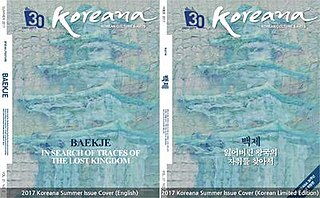
Koreana is the Korea Foundation’s quarterly, which is published in 11 languages to promote Korean arts and culture around the world.















